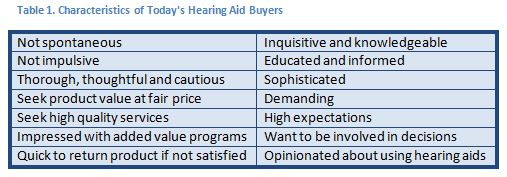This week’s post, the 184th post published at Hearing Economics, is written by Dr. Jerry Northern, who returns for another round in the guest contributor ring. As usual, his timing is perfect. Hearing Health Matters! is celebrating two milestones today — our millionth page read and our 500,000th unique reader. What better way to celebrate than with an icon in our field and industry?
Dr. Northern last weighed in on the viability of Audiology as a profession in a two-part posting. Today he looks at what Audiologists are facing right now. It’s a perfect segue from Tom Northey’s predictions of Audiology’s future.
Dr. Northern sets his sights on consumers who may, or may not, purchase hearing aids from Audiologists. Hearing Economics welcomes his vast experience and insights into present-day conundrums faced by consumers and Audiologists who wish to serve them.
Painful Conversations
I answered the telephone recently to hear my old college roommate exclaiming wildly, and at length:
“Do you know that audiologist you referred me to wants more than $6,000 for a pair of hearing aids? What’s with that? I can buy the best computer for less than $2,000; my Smartphone, complete with a fabulous camera and who knows how many apps, only cost $199 or I can buy a 65” HD television set for around $2,000! I don’t need all those fancy hearing aid features he wants to sell me – I just want to hear a little better! Is it any wonder that no one wants to buy hearing aids? You know, I can buy hearing aids online for a fraction of that price or I can go to Costco and save a bundle for the same kind of hearing aids?”
I wish that were the only such conversation I have had lately, but it poses questions that are becoming more and more difficult to answer easily. I have talked with nearly a dozen potential hearing aid buyers in this past year and they raise many of the same questions as my college roommate.
What do I say to my elderly widow neighbor who asks me where is the “best” (and I know she means least expensive) place where she can buy new hearing aids? Her current aids are about 10 years old and she wants to get replacements.
What do I tell her when she next asks me about getting her new hearing aids at Costco? In these conversations it is apparent that these potential buyers are not only puzzled about where to go for their hearing test and amplification devices, but that their online searches have only added to their confusion.
Due Diligence in a Sea of Confusion
These discussions suggest to me that today’s hearing aid buyers are actually more sophisticated than I have previously given them credit for being. They are trying to do their due diligence prior to making their purchase, but they are finding a hearing aid world that is far from easy to navigate. It is well acknowledged that hearing aid buyers do not follow traditional retail practices. Hearing aids are not bought with a spontaneous attitude of, oh-I-can’t-wait-to-get-one; let’s-go-to-the-mall-I-need-a-hearing aid; stop-here– I-see-a-hearing-aid-office.
Today’s purchases of any major item are often preceded by considerable research, either by asking for other people’s opinions, online searches, or checking the many available consumer reviews and reports. And, as always, price is an important consideration. Today’s hearing aid buyers show many, if not all, the characteristics identified in Table 1:
Utility Versus Technology
In my conversations with these potential buyers, I attempt to justify the cost of hearing aids by starting to describe the incredible features that these tiny hearing aid devices provide the wearer. However, it is not long before I see their eyes glaze over and the inevitable question follows:
“Do I really need all those things in my hearing aids?”
Today’s buyers believe that those automatic advanced features should be included in ALL hearing aids and they do not expect to pay extra for them.
Tune in next week for part 2 of Dr. Northern’s remarks.
Jerry L. Northern, PhD, is Professor Emeritus at the University of Colorado School of Medicine where he served as head of the Audiology Department for more than 26 years. Dr. Northern, a native of Denver, is a prolific writer and editor of several professional journals; he has authored a dozen textbooks in the areas of hearing and hearing disorders, including six editions of Hearing in Children and three editions of Hearing Disorders. Internationally known for his expertise in pediatric audiology, his professional background includes clinical practice, teaching, medical-legal industry experience, clinical and basic research, as well as consulting in nearly 30 countries. Dr. Northern is a founding member of the American Academy of Audiology and served as the organization’s third president. He has been honored by numerous organizations for his contributions to the field of audiology.
images courtesy of dice and langue or parole










The hearing aid gravy train is coming to a grinding halt — And audiologists stepped on it when they didn’t include “soft services” such as AR in the billing codes when they had the chance.